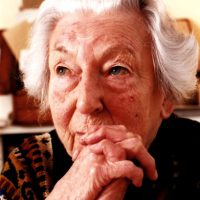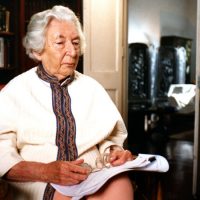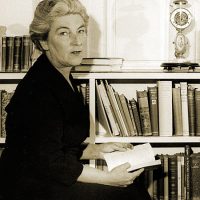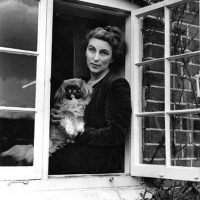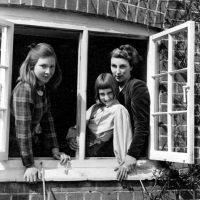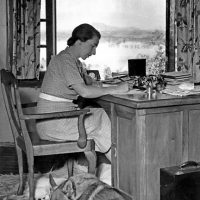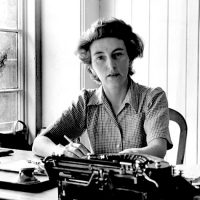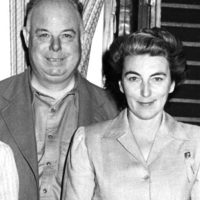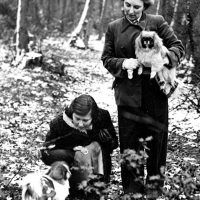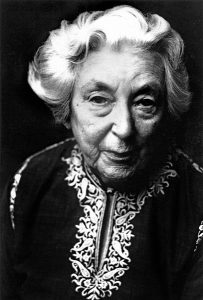
Rumer Godden was born in Sussex in 1907 but, at six months old, was taken out to India where her father ran a Steam Navigation company so that she and her three sisters spent most of their childhood on the banks of the great rivers of Assam and Bengal (now Bangladesh) where they lived in Narayangunj, a jute trading town.
They had a halcyon childhood. “I always thank God,” wrote Rumer, “that we did not have sensible parents”. This childhood time gave her real love of India that is so obvious in her writing.
She could never remember a time when she did not write. There were no libraries or schools or bookshops in this remote place so the sisters wrote their own. It was a good thing their father said that there were plenty of wastepaper baskets in the house.
The dreaded day came and the girls were sent back to England which felt anything like home and were sent to boarding school – too late. They were twelve and fourteen and could not settle. They went to five schools in two years!
Rumer Godden trained as a dancer in London and then went back to India where she ran a mixed race dancing school. She married and lived in Calcutta.
She returned to Britain for the birth of her two daughters and the publication of Black Narcissus which was met with great acclaim.
Back in India she continued with her dancing school and parted from her husband.
This was now wartime and it was not possible to go back to England so she took her two small daughters to Kashmir where, as she had no money, she rented a little Kashmiri house far in the country by the Dal Lake where they lived cheaply like the local Indians.
The house had no electricity, no running water and no road up to it. It was a full life. She had not only to look after the children but to teach them and to try earning a living by writing and running a herb farm but, as she wrote, “these were years of beauty and contentment”.
Rumer returned to England in 1947 and lived in various houses both in London, Buckinghamshire and Sussex and she remarried. It was at this time that she entered the London and American literary scene.
She sat on book judging panels, gave talks on writing and toured America giving lecture tours. She went to the famous Foyles Lunches and made broadcasts. She was on Desert Island Discs, choosing a four-poster bed as her luxury as she could use it as a sunshade or a raft.
In 1994 she went back to India with her daughter and the BBC to make the Bookmark programme of her life in the subcontinent.
Rumer was a strict disciplinarian over her writing. She worked every morning and most evenings and always in longhand with a fountain pen. She said that as an artist has to dip his brush into the paint so a writer should dip his pen into the ink and this gives time for thought.
She thought many modern books were too wordy as authors just ran away with words on their computers.
She was awarded the OBE in 1994 and won the Whitbread prize for children’s literature, many other awards and her books have been published in over forty countries.
Rumer Godden had many interests but her greatest were for dancing and for Pekinese dogs, which she kept for most of her life, and for children – she ran junior poetry workshops which kept her in touch with the young and entertained her young great-grandchildren to doll’s tea parties where she made miniature food and everyone dressed up.
She also loved opera and good whisky! Rumer studied the great religions of the world and became a Catholic in 1957.
One of her favourite axioms came from an Indian proverb that says – “everyone is a house with four rooms, a physical, a mental, an emotional and a spiritual. Most of us tend to live in one room most of the time but unless we go into every room every day, even if only to keep it aired, we are not a complete person”. She quotes this in her autobiography A House with Four Rooms.
Rumer Godden lived her later years in Rye, Sussex in Lamb House, once the home of Henry James. In her old age, she moved to Moniaive in Southern Scotland to be with her daughter where she spent the last twenty years of her life, writing and enjoying the river which ran under her study window.
Her last novel Cromartie vs. the God Shiva was published just before she died in 1998.
Rumer Godden has had many publishers in the UK and internationally. However, her main publishers in Britain were Michael Joseph and Macmillan, and in the USA, Viking.
